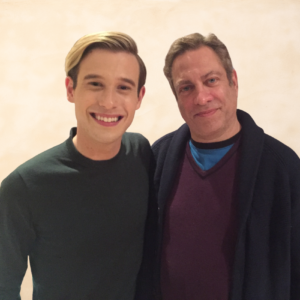Tyler Henry on Continuing Connections in Grief & The Afterlife.

How many of us have wished for some sense of connection after the loss of a loved one? We hope that our bonds continue and that death doesn’t end a relationship. This week, David speaks with the hugely popular “Hollywood Medium” Tyler Henry, who shares what he’s learned about the myth of finality, impermanence, and a unique occupational hazard they both share: compassion fatigue. This episode is helpful for thinking about how to connect with your loved one and care for yourself in the midst of pain.

Tyler Henry, star of the NETFLIX series Life after Death with Tyler Henry, continues to be the most sought-after clairvoyant medium both in the United States and around the world.
Tyler began receiving intuitive mental images when he was only 10 years old with the foretelling of his grandmother’s death. As he continued cultivating his gift, sometimes even by “reading” his classmates, word began to spread around his small California hometown. As a teenager in Hanford, Tyler began thinking of a way to incorporate his gift into a career. He graduated high school early and began taking college classes to become a hospice nurse as he believed his calling was to help people comfortably transition to the other side. At the same time, he continued to cultivate his ability by doing private readings at a local bookstore.
Word of his talents quickly spread to Los Angeles where well-known celebrities began to request private readings. Tyler found they shared the same feelings of loss and grief as all of his other clients – a kind of unspoken commonality between all people. As his clientele began to expand, an opportunity presented itself to bring his work to a much larger audience. Although shy and reserved, Tyler accepted, feeling it was his responsibility to share his ability with as many people as he could possibly reach. He has never regretted that decision.
Join me in this fascinating conversation with medium, Tyler Henry. Tyler is 26 years old, an author of two books, and is featured in the Netflix series, Life After Death.
Tyler is an intuitive person who spends a lot of time around people in grief. His insight into grief, our relationships with loved ones who have died, and our quest for continued connections inform his perspective on healing and grief.
We have so many questions about what happens to our loved ones after they die. Tyler shares his experience and says that grief is a work in progress. It’s more akin to a comma than a period. We don’t resolve our grief so much as we grow around it.
Tyler and I discuss our own experience working with people in grief and combatting compassion fatigue. It’s so important to fill your cup before you can help others.
I hope that you will find this conversation as thought-provoking and hopeful as I did.
Tender Hearts is a compassionate online community to connect with others in grief and share our stories, heartbreak, and hope. I hope that you will join me in this heart-centered online grief group. We meet live via Zoom four times a week. Click here for all of the details. I would love to see you in Tender Hearts.
www.tenderheartssupport.com - David's online grief support group, Tender Hearts
www.aboutgrief.com - Understanding loss and grief
www.lossofaparent.com - Death of a parent
www.parentforever.com - Death of a child and sibling
www.griefsuicide.com - Death of a loved one by suicide
988lifeline.org - 988 Suicide & Crisis Lifeline
nami.org - National Alliance of Mental Illness
afsp.org - American Foundation of Suicide Prevention
adultchildren.org - Adult Children of Alcoholics® & Dysfunctional Families
al-anon.org - Al-Anon Family Groups
amzn.to/31AZCPv - Finding Meaning: The Sixth Stage of Grief
actapublications.com/tear-soup - Tear Soup: A Recipe of Healing After Loss
www.elf-help.com/grief_therapy_124048.htm - Grief Therapy, Elf Help Books
The connection continues
We know that our bonds continue and that death doesn’t end a relationship. Our relationship continues. There are so many ways to feel that connection with our loved ones. We can send them love. We can do things they loved. What are ways we can connect to our loved ones?
Self-care is important
Self-care is really hard when you’re in grief. The breaks from the pain are really important. Healing isn’t always intense non-stop pain. How can you recharge when you’re feeling depleted?
Closure is more akin to a comma than a period
What if you saw your grief as a work in progress?
We grow through what we go through
Transformation happens when we have difficult experiences. How has your grief changed you?
Death makes life valuable
As we are aware of the brevity of life we also become more aware of how precious it is.
Live Fully and Grieve Fully
The two things I tell people in grief are that they have to live fully and grieve fully. Are you giving your grief attention and time? Are you making yourself available to live fully?
Licensed Professional Counselors – Get listed on Grief.com

